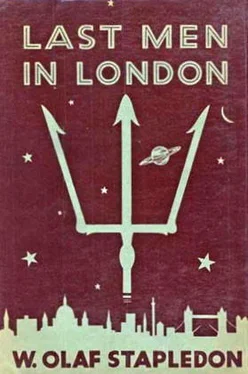So Paul settled down to teach history, geography, English and ‘scripture’. He taught whatever he was told to teach, and for mere pity’s sake, he made the stuff as palatable as he could. On the whole the boys liked him. He seemed to regard the business much as they did themselves, as a tiresome necessary grind, which must be done efficiently but might be alleviated by jokes and stories. Even discipline, formerly such a trouble to Paul, now seemed to work automatically. This was partly because he did not worry about it, having outgrown the notion that he must preserve his ‘dignity’, and partly because in the critical first days of his new school career I influenced his mood and his bearing so that he gave an impression of friendliness combined with careless firmness. Paul himself was surprised and thankful that the self-discipline of his classes relieved him of a dreadful burden. He used to say to visitors, in front of the class, ‘You see, we have not a dictator, but a chairman.’ All the same, he secretly took credit for his achievement.
By thus helping Paul to establish himself in a tolerable routine, I enabled him to keep his mind free and sensitive for other matters. The boys themselves knew that there was another side to him. Occasionally in class the lesson would go astray completely, and he would talk astoundingly about things interesting to himself, things outside the curriculum, and sometimes of very doubtful orthodoxy. He would dwell upon the age and number of the stars, the localization of functions in the brain, the abstractness of science and mathematics, the kinds of insanity, the truth about Soviet Russia, the theatre and the cinema, the cellular structure of the body, the supposed electronic structure of the atom, death and old age, cosmopolitanism, sun-bathing, the crawl stroke, Samuel Butler, coitus and the birth of babies. To these floods of language the boys reacted according to their diverse natures. The stupid slipped thankfully into torpor, the industrious revised their home-work. The shrewd masticated whatever in the harangue seemed to have a practical value, and spat out the rest. The intellectually curious listened aloofly. The main mass fluctuated between amusement, enthusiastic support, and boredom. A few sensitive ones took Paul as their prophet. After these outbursts Paul became unusually reticent and cautious. Sometimes he even told the boys they’ had better forget it all’ because he was’ a bit mad then’. He was obviously anxious that rumour of his wildness should not go beyond the class-room door. The sense of secrecy appealed to the boys. Whatever their diverse opinions of the stuff, all could enjoy a conspiracy. Paul’s own class began to regard itself as something between a band of disciples (or even prophets), a secret revolutionary society, and a pirate crew.
3. PAUL COMES TO TERMS WITH WOMAN
For some months Paul was so busy becoming an efficient school-master that he had little time for those’ other matters’ which I required him to undertake. But when he had established his technique and could look around him, he began to ask himself, ‘What next?’ His intention was to see life safely, to observe all its varieties and nuances, to read it in comfort as one might enjoy a novel of passion and agony without being upset by it. What was the field to be covered? There was woman. Until he had explored that field he could never give his attention to others. There was art, literature, music. There was science. There was the intricate spectacle of the universe, including the little peep-show, man. There were certain philosophical questions which had formed themselves in his mind without producing their answers. There was religion. Was there anything in it at all? But here, as also in the sphere of woman, one must be careful. One might so easily find oneself too deeply entangled. For the post-war Paul, entanglement, becoming part of the drama instead of a spectator, was to be avoided at all costs. But could he avoid it? Could he preserve in all circumstances this new snug aloofness, which had come to him with the end of war’s long torment of pity and shame and indignation? He knew very well that there were strange forces in him which might wreck his plans. He must be very careful, but the risk must be taken. His sheer curiosity, and his cold passion for savouring the drama of the world, must be satisfied.
Paul now began to lead a double life. In school-hours he tried to be the correct schoolmaster, and save for his lapses he succeeded. Out of school he inspected the universe. With cold judgement he decided that the first aspect of the universe to be inspected was woman. But how? There was Katherine. She alone, he felt, could be for him the perfect mate. But she was obviously happy with her returned soldier and her two children. He met her now and again. She was gentle with him, and distressingly anxious that he should like her husband. Strangely enough, he did like the man, as a man. He was intellectually unexciting, but he had an interested and open mind, and could readily be enticed out of Flat Land. Paul, however, disliked the sense that Katherine wanted to hold the two of them in one embrace. No, he must look elsewhere for woman, for the woman that was to show him the deep cosmical significance of womanhood.
The girls of his suburb were no good. In his thwarted, virginal state, they often stirred him, but he could not get anywhere with them. He lacked the right touch. Sometimes he would take one of them on the river or to a dance, or to the pictures, but nothing came of it. They found him queer, a little ridiculous, sometimes alarming. When he should have been audacious, he was diffident. His voice went husky and his hand trembled. When he should have been gentle, he was rough. With one of them, indeed, he got so far as to realize that to go further would be disastrous; for though she was a ‘dear’ she was dull. Moreover, she would expect to be married. And for marriage he had neither means nor inclination.
Of course there were prostitutes. They would sell him something that he wanted. But he wanted much more than they could sell. He wanted, along with full physical union, that depth of intimacy which he had known with Katherine. Once in Paris while he was coming home on leave, a girl in the street had said to him ‘ Venez faire l’amour avec moi ’, and he had stopped. But there was something about her, some trace of a repugnance long since outworn, that made his cherished maleness contemptible in his own eyes. He hurried away, telling himself she was too unattractive. Henceforth all prostitutes reminded him of her. They made him dislike himself.
What other hope was there for him? He once found himself alone with a little dusky creature in a railway carriage. She reminded him of a marmoset. Might he smoke, he asked. Certainly. Would she smoke too? Well, yes, since there was no one else there. They talked about the cinema. They arranged to meet again. He took her to a dance, and to picture shows, and for walks. She told him she was unhappy at home. Things advanced to such an extent that one day he put a protecting arm round her, with his hand under her breast; and he kissed her. She began to trust him, rely on him. Suddenly he felt an utter cad, and determined to give her up. But when he said he would never see her again, she wept like a child and clung to him. He told her what a beast he was, and how he had intended merely to get what he wanted from her, and take no responsibility. As for marrying her, he was not the marrying sort. She said she didn’t care. She didn’t want marriage, she wanted him, just now and again. Yet somehow he couldn’t do it. Was it fear of the consequences? No, not fear, shame. She was only a child, after all, and he found himself feeling responsible for her. Damn it, why couldn’t he go through with it? It wouldn’t hurt her really. It would all be experience. But he couldn’t do it. Yet he had not the heart to keep away from her. Hell! Then why not marry her and go through with it that way? No, that would be certain hell for both of them. The affair began to get on his nerves. His teaching was affected; for in class he was haunted by images of the little marmoset, of her great wide black eyes, or of the feel of her hair on his cheek. Obviously he must put an end to it all. He wrote her a strange muddled letter, saying he loved her too much to go on, or too little; that in fact he did not really love her at all, and she must make the best of it; that he was desperately in love with her and would be miserable for ever without her; that the upshot anyhow was that he could never see her again. He kept to his resolve. In spite of a number of beseeching letters, he never saw her or wrote to her again.
Читать дальше












